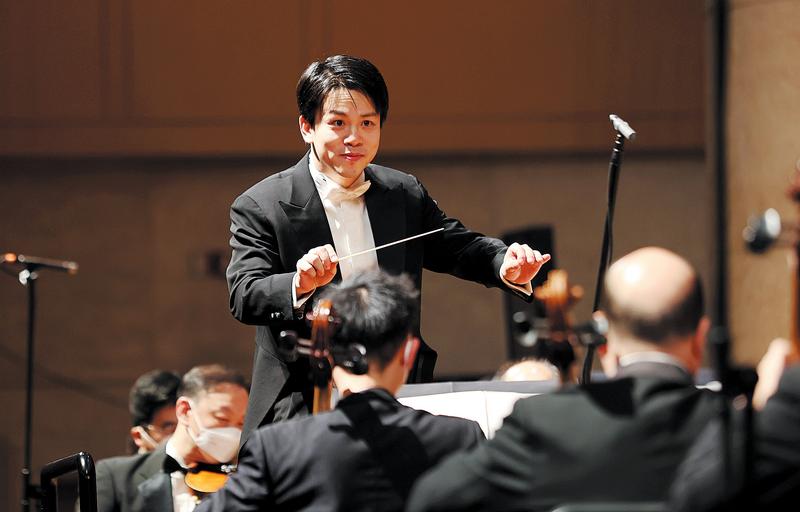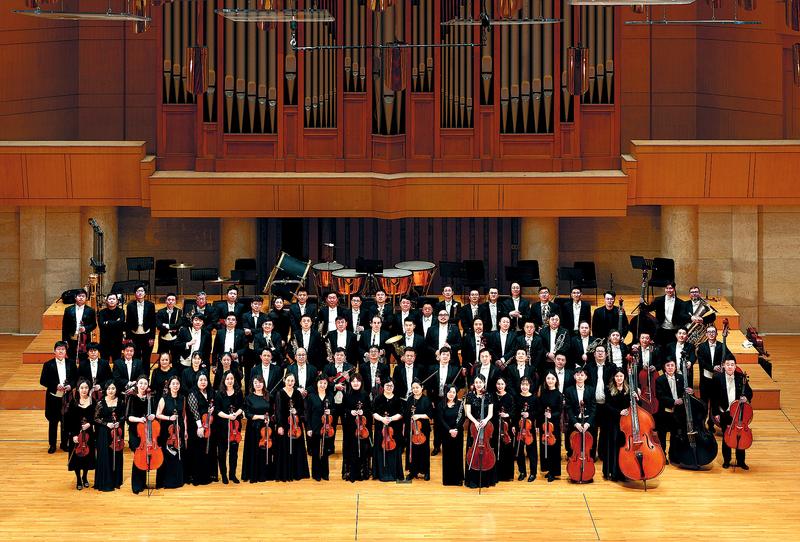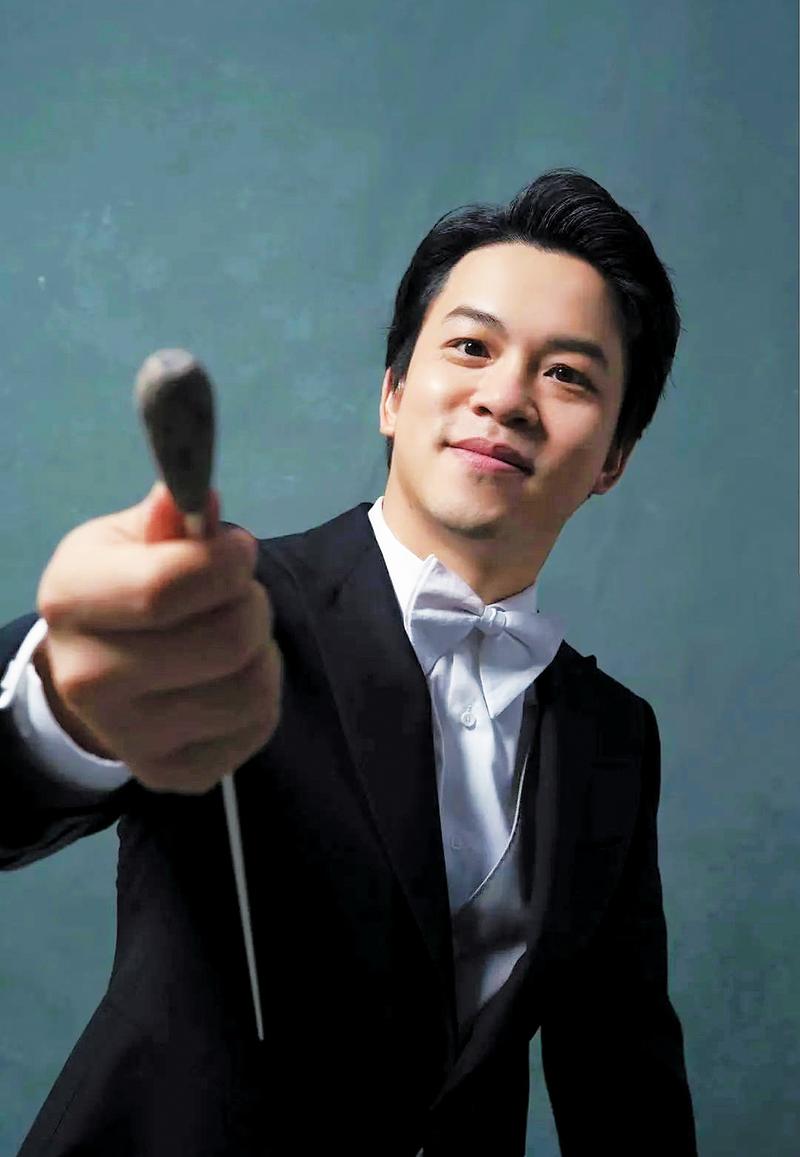Young, emerging maestro Li Haoran kicked off the New Year program of the Forbidden City Concert Hall in Beijing, Cheng Yuezhu reports.
 Li Haoran conducts An Homage to Classics at Beijing's Forbidden City Concert Hall, marking the beginning of the theater's New Year concert series. (PHOTO PROVIDED TO CHINA DAILY)
Li Haoran conducts An Homage to Classics at Beijing's Forbidden City Concert Hall, marking the beginning of the theater's New Year concert series. (PHOTO PROVIDED TO CHINA DAILY)
Participating in the Rachmaninoff International Competition for pianists, composers and conductors in 2022 was an emotionally charged experience for conductor Li Haoran.
As it was the first edition of the competition, Li says that he found the English translation of the regulations confusing. It wasn't until the very end that he learned the pieces for the final round were predetermined rather than based on individual choices.
When it comes to music, the cultural background and language are very important, but it’s also about being natural and expressing genuine feelings.
Li Haoran, conductor
With only two days to cram for the final round, he felt defeated and wanted to give up the competition entirely.
"One of my good Russian friends told me a story about Paganini, who lost three strings during one performance and kept going on the one remaining string. Being a musician means facing up to all sorts of challenges, and this encouragement made me decide to carry on," Li says.
Eventually, Li won the third prize and a bronze medal in the conducting section, along with a series of invitations for him to work with Russia's preeminent singers, pianists and orchestras.
"I feel that I'm quite fortunate, to have made so many new friends and to have the opportunity of working with so many orchestras," Li says.
"Competitions for me are not about the prizes. What I care about the most is for people to see me and recognize my conducting skills."
Born in 1986, Li has dazzling experience of winning international competitions and working with international orchestras. He studied at the Central Conservatory of Music in Beijing, majoring in conducting under the mentorship of well-known conductor Xia Xiaotang.
 The two New Year concerts, held on Dec 28 and 29, were performed by the Beijing Symphony Orchestra. (PHOTO PROVIDED TO CHINA DAILY)
The two New Year concerts, held on Dec 28 and 29, were performed by the Beijing Symphony Orchestra. (PHOTO PROVIDED TO CHINA DAILY)
In 2011, he enrolled in the Hanns Eisler School of Music Berlin to study a master's degree under German conducting educators Christian Ehwald and Hans-Dieter Baum. He received the Konzertexamen degree, the highest certification of German conservatories, in 2017.
After the Rachmaninoff competition, he was occupied with concerts around Europe, including those at the Copenhagen Opera House in Denmark, the Verdi Festival in Italy and the China-Germany International Cloud Music Festival that celebrated the 50th anniversary of China-Germany diplomatic relations.
He recently returned to China, with two concerts titled An Homage to Classics on Dec 28 and 29 at Beijing's Forbidden City Concert Hall, marking the beginning of the theater's New Year concert series.
Performed by the Beijing Symphony Orchestra, the concert included works by Russian classical composers, such as well-known pieces by Tchaikovsky, excerpts from Igor Stravinsky's orchestral work The Firebird and the symphonic suite Scheherazade by Nikolai Rimsky-Korsakov.
Li had never conducted most of these pieces before, other than The Firebird and Tchaikovsky's Polonaise from the opera Eugene Onegin, but new ideas kept emerging during the rehearsals, including the use of rubato — a change in rhythm or tempo not indicated in the score — for certain phrases.
"An idea came to me just several days before the concert. I simply thought, 'why not?' When it comes to music, the cultural background and language are very important, but it's also about being natural and expressing genuine feelings," Li says.
"When a person understands the culture and language, music comes naturally. I used to wonder why some conductors' rubato choices seem particularly effortless, and the answer lies in their understanding of the culture, language and tradition behind the music."
Therefore, when working with orchestras or on music pieces from different countries, he can grasp the nuances in styles, which correspond with the relevant cultures and languages, such as the light and airy sounds of French impressionism, or a German orchestra's emphasis on articulation.
 Li won the third prize and a bronze medal at last year's Rachmaninoff International Competition for pianists, composers and conductors in 2022. (PHOTO PROVIDED TO CHINA DAILY)
Li won the third prize and a bronze medal at last year's Rachmaninoff International Competition for pianists, composers and conductors in 2022. (PHOTO PROVIDED TO CHINA DAILY)
Li also says that, although he works mainly with international orchestras, he believes Chinese orchestras are making steady progress. Sometimes, he notes, Chinese orchestras are not lacking in technique, but in the understanding and expression of culture.
The concert hall's New Year series began with two shows by Li, followed by a recurring performance of film soundtracks on Dec 30, which gained popularity following its first performance in September.
On New Year's Eve, veteran conductor Yang Li and soprano Guo Fei, along with the Beijing Symphony Orchestra, presented a range of classical works by composers from different parts of the world and from different historical periods.
The series ended with a concert on Jan 1 with conductor Xia taking the baton. Soprano Zhang Liping gave performances of works from home and abroad, including Italian composer Giacomo Puccini's arias and the Chinese song, I Love You, China. Harpist Sun Shimeng performed Spanish composer Joaquin Rodrigo's Concierto de Aranjuez arranged for harp.
"Li's two performances kicked off the 2023 New Year concert series. It is especially meaningful that we are once again gathering here and enjoying live music," says Xu Jian, director of the concert hall.
"Each concert featured a different conductor, from the young emerging Li Haoran, to the veteran conductors Fan Tao, Yang and Xia. Every conductor brought their own arrangement of pieces with different styles."
Xu says that, for the upcoming Spring Festival, the concert hall will host another series that centers on traditional and folk music, including classic excerpts of Peking Opera performances, Chinese cross-talk pieces, as well as an amalgam of regional opera styles.
Contact the writer at chengyuezhu@chinadaily.com.cn


